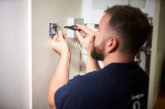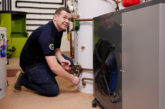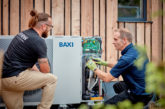
Graham Wright, Chairman of the Heat Pump Association, explains why the next generation of heating installers will play a crucial role in changing consumer habits and scaling up heat pump deployment to help reduce the carbon emissions from the UK’s heating supply.
The UK has shown commitment to tackling the climate crisis by setting a significant – and necessary – target to meet net zero emissions by 2050. But, despite leading the way on emissions targets, we still have some way to go before we can be classed as a pioneer in low carbon heating. Fossil fuel heating systems are still used in the majority of buildings here in the UK, contributing to the climate crisis, whilst low carbon solutions wait in the wings.
In 2018, heat pump sales in the UK were around 27,000 units. In order to decarbonise the heat supply, it is thought that this number will need to rise to over one million annual installations by the mid-2030s. At this rate, the deployment of the 19 million heat pumps recommended by the Committee on Climate Change (CCC) in order to attain net zero by 2050 could be reached.
In the HPA’s recently launched vision report, “Delivering Net Zero: A Roadmap for the Role of Heat Pumps”, we stated that the industry’s efforts to establish wide-scale deployment of heat pumps in the UK would be delivered through three key pillars:
*Putting the consumer at the heart of change
*Upskilling the installer base to create a cohort of highly skilled low-carbon heat installers
*Working with government to ensure a supportive policy mix
Increasing consumer awareness
We have placed an emphasis on the role of installers as they will play a crucial role in increasing awareness among their customer base. At the moment, a potential complication to the uptake of heat pumps is the need for installers to improve their knowledge and skills in regard to the technology as consumers typically rely on the expertise and advice installers are able to provide.
Consumers are more likely to take-up a new technology if it provides a better service than they currently experience. Heat pumps can do this, but consumers need to be made aware of the benefits. With a highly skilled installer base, heat pumps can be deployed to a standard that ensures consumers get the most out of them and their benefits can be properly explained.
A high proportion of current heating installers are therefore likely to need to upskill to be able to install low carbon heating systems. There is, for example, a need to size heat pumps more carefully according to the heat demand of a building – heat emitters often need to be upgraded to work with lower flow temperatures and hydraulic balancing is carried out to ensure that the distribution of water in heating systems is optimised. Though there will be new entrants to the installation market, the expectation is that the majority of installers will need to come from the current boiler installer base.
There is also a responsibility from industry and government to ensure that new entrants to the installer base are adequately trained and possess the skills that they will need in the long term. The HPA supports the offering of apprenticeships to encourage the younger generation of installers to develop their skill base and ensure that the quality of heat pump installations is high, the knowledge of the benefits that the technology can bring is commonplace, and there are sufficient installer numbers to scale up deployment to the required levels.
Maintaining standards
To maintain high standards and guarantee quality, there is a strong case for bringing in a ‘skills card’ of some sort, specifically for installers of renewables. The skills card could be used to highlight the separation in the abilities needed to install heat pumps, such as the design, install and commissioning functions. This division could allow specialisation across these skills and help to optimise the time for training and increase the labour force.
The heat pump industry is ready to meet the upskilling challenge by providing the delivery of training through the development of suitable qualification schemes and administration of this. However, it is crucial that there is enough interest from people wanting to undergo this training. This is reliant on a firm commitment from the government to indicate that low carbon heat is the ‘direction of travel’ and fossil fuel heating will be phased out sooner rather than later.
To read the Heat Pump Association report – Delivering Net Zero: A Roadmap for the Role of Heat Pumps – click here













